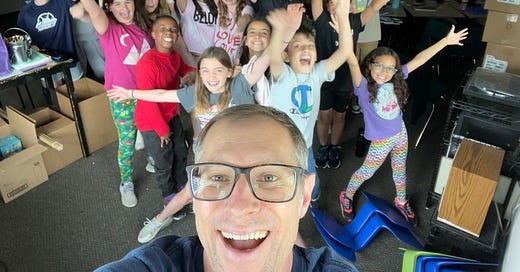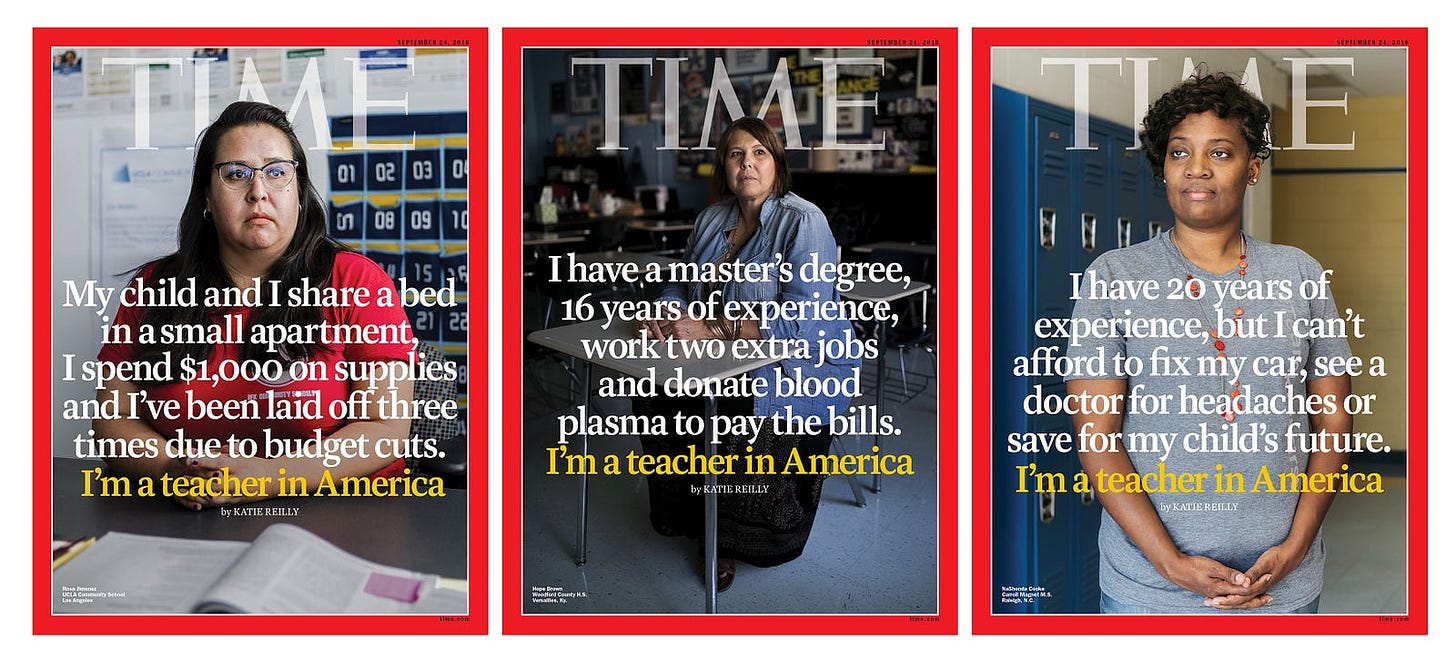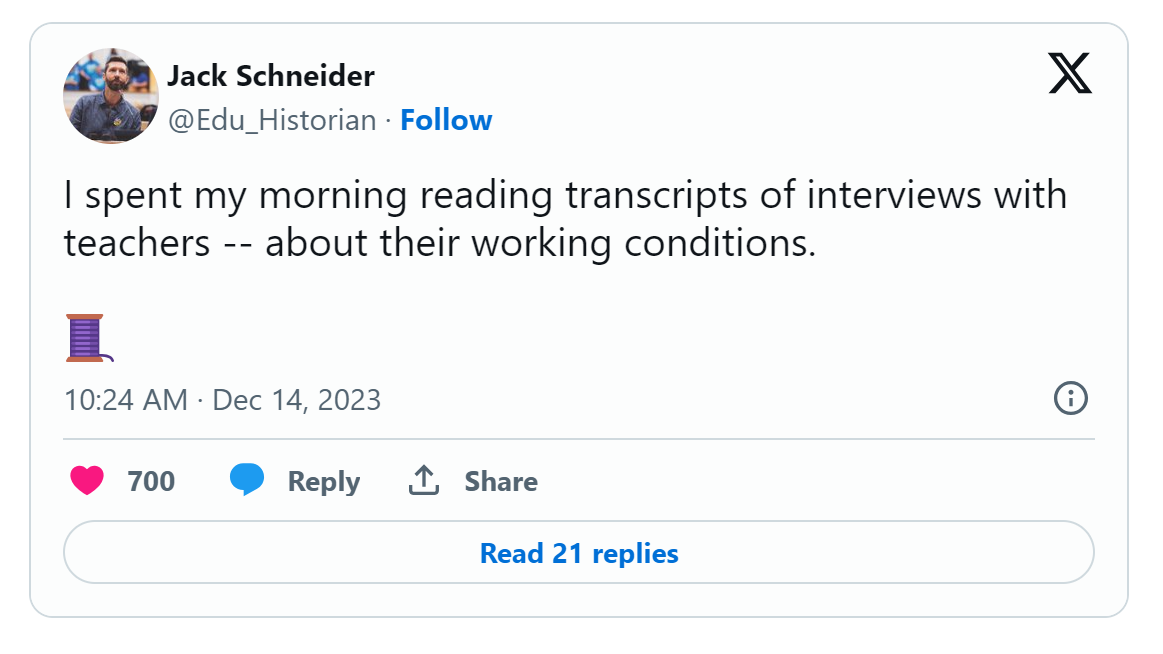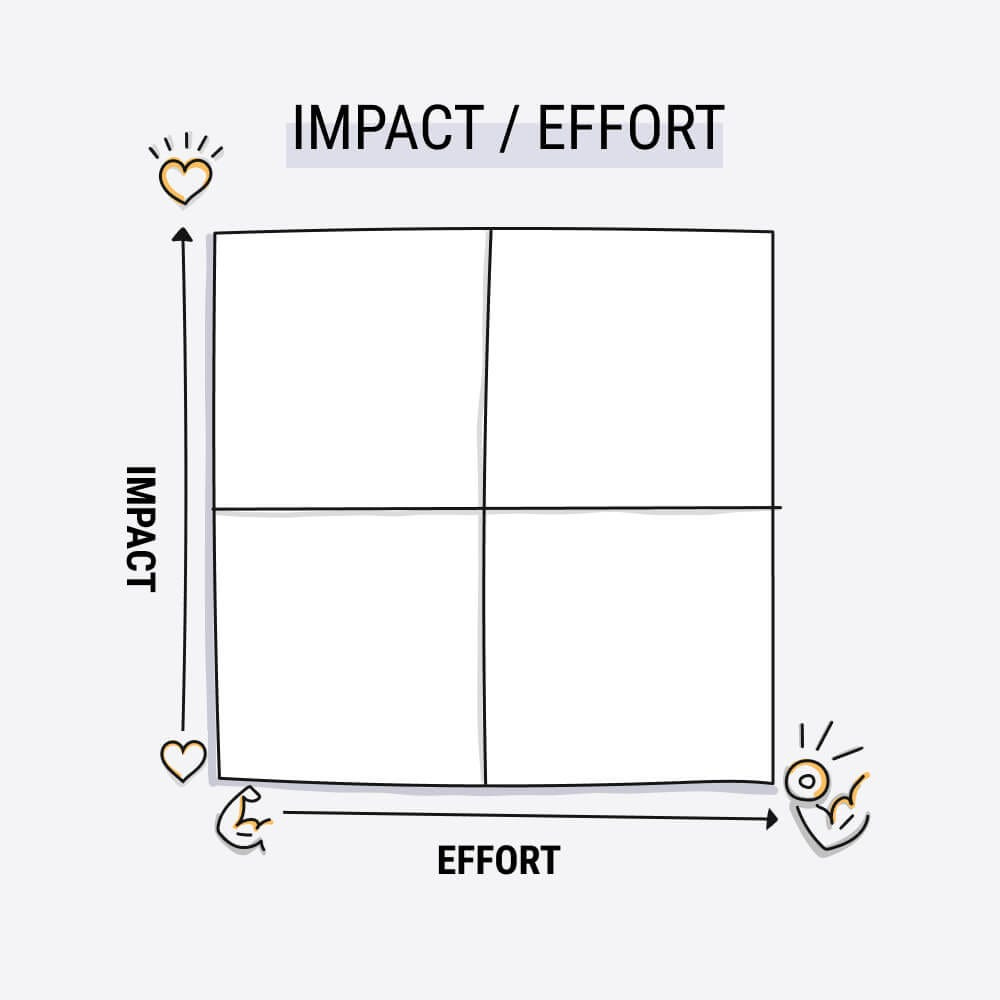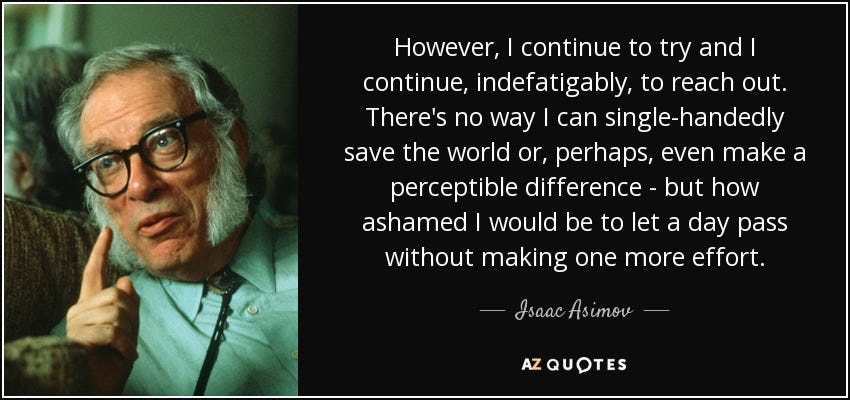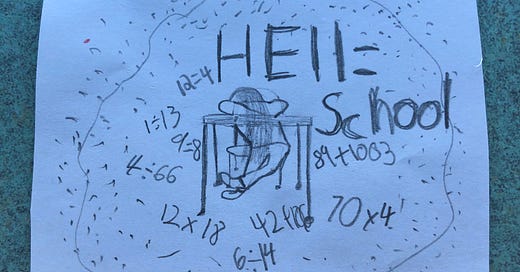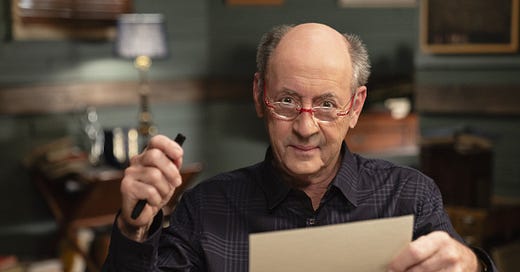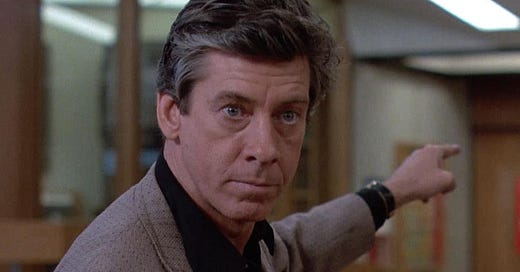

Discover more from Adrian’s Newsletter
Why did you become a teacher?
This is not an interview question designed to elicit a canned response. This is a genuine question I’m asking myself lately to help me understand why anyone would want to become a teacher today. Teachers are publicly slandered for not doing their jobs effectively and then accused for indoctrinating children. Teachers are derided for their choice of career, reducing it to a lazy option in order to get free summer vacations. Teachers are expected to carry the weight of future generations, making tens of thousands of decisions every day, while being insufficiently paid to do so. It’s more than insufficient. Teacher pay is insulting. Many teachers cannot afford to live on their income.
Teaching today is a dangerous profession. Over 300,000 children at 346 schools have experienced gun violence. Gun violence is now a ubiquitous aspect of school life. Many teachers are scared that they might be shot while teaching, especially now that there are first-graders who are intentionally shooting their teachers.
Seriously, why did you become a teacher?
At this point, if you are having this conversation with a teacher, many educators may explain their career choice using words like calling, pedagogy, and passion and phrases such as inspiring students and positive impact. It makes sense that people would become teachers for greater aspirations of being a public servant or changing the world. I’m sure if you asked members of law enforcement or firefighters, they would respond in a similar way. They want to protect others and make their communities safer.
You may have even heard the response, I didn’t become a teacher for the money. Artists and teachers are two groups that seem to invoke martyrdom in order to justify rejecting a livable wage and healthy working conditions to make the world a better place. This pervasive idea reinforces underpaying and undervaluing educators. Instead of seeing teachers as professionals, many view them as over-payed babysitters.
Among veteran educators (20+ years), you probably won’t hear these types of answers. When discussing teaching as a profession, I find the conversation inevitably turns toward retirement. How many years do you have left? It’s odd because it can almost seem like teachers are discussing jail sentences not careers. You may even hear a non-educator be critical of this collective cynicism and state with a hint of condensation, If you feel this way, you should retire. Teaching is supposed to be a selfless act. You should feel invigorated with molding the young minds of today. You should LOVE teaching. Teaching should be fun, not miserable.
Yes, we should all be so lucky to have jobs we love. In a perfect world, we should love our jobs, not just like them, and we should be paid generously for the work we do.
If teachers seem critical and disloyal to public education, it is for good reasons. Simon Sinek reminds us that too often we [society] blame[s] the individual for their disloyalty to their job.
How can I create an environment in which my people can work at their natural best?
Simon Sinek
Instead, Sinek explains, “we need to be looking toward [an organization’s] leadership; it is their responsibility to curate an environment in which their employees feel inspired, safe and fulfilled.” Almost all of the biggest problems faced by the teachers today are caused by poor leadership and a toxic work culture. Many teachers do not feel valued by their administration, communities, or society at large. Teaching is hard work and it is important to acknowledge that fact. Teaching is both a passion and can also feel like a slog. Teaching is both more challenging and more rewarding than it has ever been. Teachers should be allowed to share their struggles without being encouraged to leave the profession. Teachers should be able to demand a positive working environment and healthy school culture without being shamed and insulted.
Jack Schneider, education scholar at the University of Massachusetts, recently posted an interesting thread on X (formerly known as Twitter).
The takeaway is that teachers just want to be respected and acknowledged for their work. One teacher states, “Just stop gaslighting me. Just stop saying my work is easy. Or that we’re falling down on the job. Or that we’re the enemy.”
Schneider explains that most “interviewees were happy to step up to the plate, even as they named all of the ways that they weren’t being supported. But the pain comes across so clearly when they describe how invisible their labors are. Over and over they describe giving everything to the work, and then being asked for more.”
This had me thinking about my influence as an educator. Does my administration recognize the positive influence I have on my students. Does my parent community? Does society see the influence educators have on civilization. Do I?
Invisible Influence
A teacher’s positive influence on their students is largely invisible to others. When a teacher has a negative influence on their students, or creates an authoritarian learning environment, that is quite visible. When things are going relatively smoothly for both teachers and students, the net impact is difficult to see. You probably have heard the Maya Angelou quote, “At the end of the day people won't remember what you said or did, they will remember how you made them feel.” But how do we measure that?
I believe that we all want to be recognized for work we do. Whether we are a stay-at-home parent, a writer, a social worker, a janitor, and artist, a server at a restaurant, or a teacher, it is a very human want to be recognized for effort. Even if we fail, we want others to see how hard we tried. Teaching requires a lot of effort that is ignored.
If you were to graph effort versus impact on a matrix, low effort-high impact tasks could be labeled as “Quick Wins” while low effort-low impact jobs might be considered menial. Where would you put teaching? Teaching requires a ton of effort and the impact can be quite high (high-effort; high impact). But what if that impact is invisible? Is teaching destined to always be considered a thankless task?
How would teaching change if the impact teachers had on society was more visible? What would that visible impact look like? Imagine a firefighter rushing into a blazing building to rescue a family trapped in the flames. Their success (or failure) is immediately visible. They either put out the fire and save the people trapped inside, or they don’t and the fire continues to burn and people die. A firefighter’s effort is undeniable. What if teaching were like that?
I think there would be a lot more teachers. Some might become educators out of a hero/savior fantasy about saving the world one disadvantaged child at a time. If a teacher’s net effort and impact were move visible, teaching would be seen as more rewarding. I don’t think many people in society actually understand how hard teachers work with students. When a teacher has a successful lesson, making a particularly abstract concept more concrete to students, it is because of a great amount of preparation, patience, effort, and skill; much of which goes unnoticed by those outside the classroom.
Any teacher will recognize that Aha! moment in the classroom when a student understands something. Or when a teacher has a breakthrough with a challenging student. Or when a former student comes back after a few years to tell them how much they loved your class. Some of these impacts happen relatively quickly, others take time to see. Societal influence takes years to develop, if at all. Still, most teachers teach for these invisible influences. They believe that education has the greatest impact on society, whether we can see it or not.
A Thought Experiment
George Saunders describes his love of reading and writing as such:
“…those of us who read and write do it because we love it and because doing it makes us feel more alive and we would likely keep doing it even if it could be demonstrated that its overall net effect was zero, and I, for one, have a feeling that I would keep doing it even if it could be demonstrate that its overall net effect was negative.”
As an educator, I’m constantly looking to improve the classroom experience for my students. I strive to make sure that my time with students is overall a positive academic experience. I teach because I love teaching. I love working with students. Like Saunders, teaching makes me feel alive.
Let’s take the above question, why did you become a teacher, and incorporate Saunders’ quote. Would you keep teaching if your overall net effect on society was zero? What if you never knew whether you made a difference?
If I learned that, through scientific analysis, teachers do not make a difference either in the lives of their students or in society as a whole, I would be devastated. My initial reaction would be to quit teaching that day. What is the point of all of this Sisyphean work if it will never amount to anything? However, Saunders gives me pause. I do love teaching. If I didn’t love teaching, then I probably would have quit a long time ago as teaching conditions have worsened and schools have become more unsafe (e.g.: standardized testing, large class sizes, reduced planning time, unrealistic expectations, school shootings). Sitting with Saunders’ quote reminds me of this Isaac Asimov quote.
I have to believe that I am making a difference in my students’ lives. So, would I quit if I learned that my net impact on society was zero? No, as long as I knew I was making some small difference for each student in my classroom.
Teaching is seen as a noble profession. Many believe that there is a call to become a teacher. But teaching is first, and foremost, about human relationships; acts of service and building relationships with your students. Even if I knew that I was not making the world a better place, I would continue teaching because of our interconnectedness as human beings. Humanity thrives through connection; not brief passing-bys, but kind, loving, human connections made with each other. I may not be changing the world, but for one day at a time, I can make sure that each one of my students has a good day; that they feel seen and cared for and respected and even loved.
There is no guarantee that I will be a successful teacher. Especially now, the odds are stacked against teachers. This does not mean that I accept things as they are. Teachers need to be paid more. Teachers need smaller class sizes and longer planning periods. Teachers deserve respect as professionals with expertise in teaching and learning. Educators work their butts off in service to their students. Teachers continue to work miracles with very limited resources.
I will probably never change public education in my lifetime. It pains me to write this, but I’ve been teaching 20+ years and in many aspects, teaching is harder now than ever. Public education still clutches to the status quo. As a system, public education is succeeding in what it was designed to do: separate children into groups of obedient, compliant, workforce ready cogs. Instead of educating whole children with their unique intersections of race, gender, identity, strengths, and weaknesses, we dispense standardized lessons. When others comment on my critical opinions of public education, I paraphrase James Baldwin.
I love America more than any other country in the world, and, exactly for this reason, I insist on the right to criticize her perpetually. I think all theories are suspect, that the finest principles may have to be modified, or may even be pulverized by the demands of life, and that one must find, therefore, one's own moral center and move through the world hoping that this center will guide one aright.
James Baldwin
I’m not cynical. I believe in public education more than anything and that is why I am critical of it. Like Asimov, I would be ashamed if I did not continue to make an effort to create a new educational system that is hopeful, anti-racist, positive, and empowering.
So, again, Why did I become a teacher?
I teach to earn an income for my family. I teach because I love it. I teach because I still believe that my students matter. I teach because it is hard work and I don’t shy away from challenges. I teach because I’m good at it. I teach because I believe that I have a civic and moral responsibility to be an educator. I teach because I hope that I am making a positive difference in my students’ lives.
Teaching is a both/and. Teaching is both an inspiring profession and a challenging career. Teaching is both a calling and a job. Teaching is both a struggle and a joy. Teaching is both rewarding and exasperating. Teaching to change the world is both an impossible and a worthy goal. As a society, we need to stop viewing teachers as those who can’t do any other jobs, but choose to be an educator, even if they never see the fruits of their labors.
I make no apologies for being an educator. I will never be the best teacher in the world, but I will continue to work every day to try and be better than I was yesterday. Indefatigably.
Have a great week!
—Adrian.
Resources
I have watched this video many times, especially when I’m feeling burned out. Teachers may not be able to see their impact, but that impact is great.
For those more scientifically oriented, this study is fascinating, presenting findings that explain how Grade 10 students experienced their teachers’ expectations in ways that they reflected impacted their academic outcomes.
Again, another great video to raise your spirits! If you don’t know Trevor Muir, you need to. He creates amazing resources for educators and students.
Subscribe to Adrian’s Newsletter
Sharing my favorite resources for creating memorable learning experiences, epic classroom fails, and hopefully some success stories, too!

